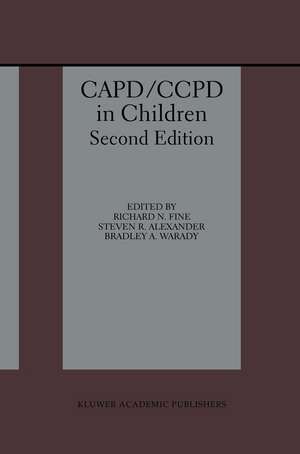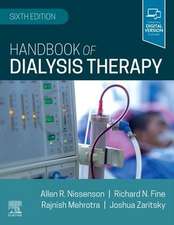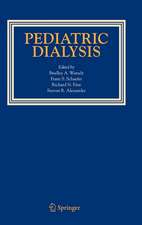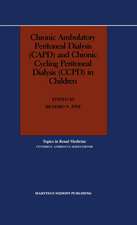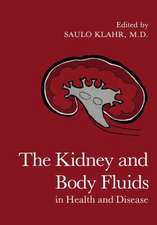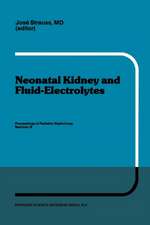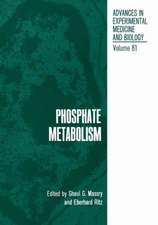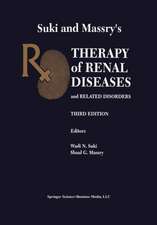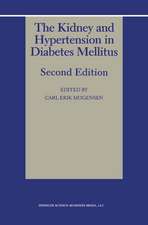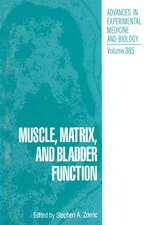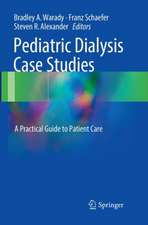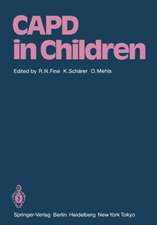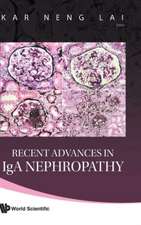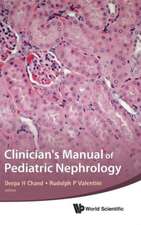CAPD/CCPD in Children
Editat de Richard N. Fine, Steven R. Alexander, Bradley A. Waradyen Limba Engleză Paperback – 3 ian 2012
It has been more than a decade since the initial publication of CAPD/CCPD in Children. In the interim, a great deal of clinical experience with patients receiving peritoneal dialysis has been accumulated and research efforts have substantially increased our understanding of the technique. Therefore, we felt that a second edition of CAPD/CCPD in Children was propitious to update the advances of the past decade.
| Toate formatele și edițiile | Preț | Express |
|---|---|---|
| Paperback (1) | 1428.54 lei 6-8 săpt. | |
| Springer Us – 3 ian 2012 | 1428.54 lei 6-8 săpt. | |
| Hardback (1) | 1435.85 lei 6-8 săpt. | |
| Springer Us – 30 dec 1998 | 1435.85 lei 6-8 săpt. |
Preț: 1428.54 lei
Preț vechi: 1503.73 lei
-5% Nou
Puncte Express: 2143
Preț estimativ în valută:
273.44€ • 297.11$ • 229.84£
273.44€ • 297.11$ • 229.84£
Carte tipărită la comandă
Livrare economică 21 aprilie-05 mai
Preluare comenzi: 021 569.72.76
Specificații
ISBN-13: 9781461372370
ISBN-10: 1461372372
Pagini: 640
Ilustrații: XIII, 622 p.
Dimensiuni: 155 x 235 x 34 mm
Greutate: 0.89 kg
Ediția:2nd ed. 1998
Editura: Springer Us
Colecția Springer
Locul publicării:New York, NY, United States
ISBN-10: 1461372372
Pagini: 640
Ilustrații: XIII, 622 p.
Dimensiuni: 155 x 235 x 34 mm
Greutate: 0.89 kg
Ediția:2nd ed. 1998
Editura: Springer Us
Colecția Springer
Locul publicării:New York, NY, United States
Public țintă
ResearchDescriere
During the past quarter century there has been a renaissance of interest in the use of peritoneal dialysis as the primary dialytic modality for the treatment of children with end-stage renal disease (ESRD). The development of continuous ambulatory peritoneal dialysis (APD) has facilitated the provision of prolonged dialysis to infants, children and adolescents and has provided pediatric nephrologists worldwide with a real opportunity to administer effective dialysis therapy to all patients afflicted with ESRD.
It has been more than a decade since the initial publication of CAPD/CCPD in Children. In the interim, a great deal of clinical experience with patients receiving peritoneal dialysis has been accumulated and research efforts have substantially increased our understanding of the technique. Therefore, we felt that a second edition of CAPD/CCPD in Children was propitious to update the advances of the past decade.
It has been more than a decade since the initial publication of CAPD/CCPD in Children. In the interim, a great deal of clinical experience with patients receiving peritoneal dialysis has been accumulated and research efforts have substantially increased our understanding of the technique. Therefore, we felt that a second edition of CAPD/CCPD in Children was propitious to update the advances of the past decade.
Cuprins
1. CAPD/CCPD for Children in North America: The NAPRTCS Experience; S.R. Alexander, et al. 2. The European Experience with CAPD/CCPD in Children; A. Edefonti, et al. 3. The Japanese Experience with CAPT/CCPD in Children; M. Honda. 4. CAPD for Children in a Developing Country; R. Munoz. 5. Transplantation of the Pediatric CAPD/CCPD Patient; B. Chavers. 6. Structure and Function of the Pediatric Peritoneal Membrane; B. Morgenstern. 7. Peritoneal Equilibration Test in Children; D. Geary, B.A. Warady. 8. Adequacy of Peritoneal Dialysis in Children; F. Schaefer. 9. The Organization and Management of a Pediatric Dialysis Unit; L. Jones, C. Smith. 10. Growth in Children on CAPD/CCPD and the Use of Recombinant Human Growth Hormone to Treat Growth Delay in These Children; B. Tonshoff, O. Mehls. 11. Special Considerations in the Care of the Infant CAPD/CCPD Patient; A.M. Neu, B.A. Warady. 12. Anemia and Its Treatment in Children on CAPD/CCPD; K. Jabs, W.E. Harmon. 13. Diagnosis and Treatment of Renal Bone Diseases in Children Undergoing CAPD/CCPD; B.D. Kuizon, I.B. Salusky. 14. Immunizations in Pediatric CAPD/CCPD Patients; B.A. Fivush, A.M. Neu. 15. Special Considerations in the Prescribing of Medications for the Pediatric CAPD/CCPD Patient; D.L. Blowey, et al. 16. Prescription of Peritoneal Dyalysis: CAPD, CCPD, COPD, IPD or TPD? M. Fishbach, et al. 17. Ten Years' Experience with CAPD Catheters; E.T. Sojo, et al. 18. When and How to Use Nasogastric and GastrostomyFeeding for Nutritional Support in Infants and Children on CAPD/CCPD; A.R. Watson, et al. 19. Peritonitis in Pediatric Continuous Peritoneal Dialysis; A. Tranaeus. 20. Prevention, Diagnosis, and Treatment of PD Catheter Exit-Site and Tunnel Infections in Children; E. Harvey, et al. 21. Gynecologic Issues in CAPD/CCPD; J. Kass-Wolff, K.D. Bradshaw. 22. Long Term Function of the Peritoneal Membrane in Children Receiving CAPD/CCPD; S.P. Andreoli. 23. Psychosocial Development and Adherence to Medical Regimens in Children with Chronic Renal Failure; B.L. Rader, S.L. Watkins. 24. The Ethics of Withholding and Withdrawing Therapy in Infants and Young Children; M. Shooter. 25. Urinary Tract Diversion and Other Urologic Considerations in Children on CAPD/CCPD; A.L. Freedman, R. Gonzalez. 26. The Effect of Renal Neurotoxicity on Cognitive Development; B.L. Rader. 27. Residential Camping for Children with End-Stage Renal Disease; B.A. Warady. 28. Avoiding and Coping with Patient and Fmaily Burnout; A.R. Watson, C. Gartland. 29. A Parent's View of CAPD/CCPD; S.W. Kamphuis. 30. Maintaining Intact Families on CAPD/CCPD; E. Corsini. 31. New Peritoneal Dialysate Solutions and Intraperitoneal Therapies; S.L. Watkins. 32. Nutritional Therapy for Children on CAPD/CCPD: Theory & Practice; D. Secker, P. Pencharz. 33. Peritoneal Dialysis in Adolescents; E. Kohaut.
